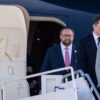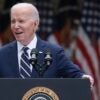Today President Barack Obama unveiled his Iraq policy in a speech at Camp Lejeune, North Carolina. He announced that he will pull out U.S. combat forces by the end of August 2010, but will retain a “transitional force” of 35,000 to 50,000 personnel (compared to the 142,000 there now) that will pursue a “new strategy” of undertaking a gradual transition to full Iraqi responsibility.
This “new strategy” appears to be similar to the Bush Administration plans for Iraq in many respects, although the pace of troop withdrawals may be accelerated and is likely to be determined more by political considerations in Washington than by military conditions on the ground in Iraq, which is a strong reason for concern. But both Administrations set a goal of withdrawing all U.S. troops by the end of 2011, in accordance with the Status of Forces Agreement, although it is likely that the Iraqis will request an extension of this overly ambitious deadline.
President Obama reportedly was presented several weeks ago with three options for target dates for pulling out combat troops: 16 months, 19 months, and 23 months. He chose the middle option, which was three months longer than his campaign pledge to pull all combat troops out within 16 months of his inauguration.
But while the President boldly proclaimed that combat will “end” by the end of August 2010 it is highly unrealistic to expect that will actually happen. The insurgents and various militias will have considerable influence on that matter. And any or all U.S. troops could potentially find themselves in combat at a moments notice because there are no clearly defined front lines in an insurgency. Moreover, the President has indicated that counter-terrorist operations will continue against Al-Qaeda in Iraq, which presumably will involve combat.
On Capitol Hill, Obama’s Iraq policy received luke-warm support from Republicans while being criticized by the liberal wing of the Democratic Party. House Speaker Nancy Pelosi reportedly was particularly upset with the size of the transitional force, complaining that “I don’t know what the justification is for 50,000.” This is disingenuous posturing, coming as it does from someone who opposed the surge because she wrongly believed that the war already was lost and Iraq was spinning out of control. Now she apparently believes that the troops should be pulled out faster, because everything is rosy in Iraq a few weeks after a change of administrations in Washington.
President Obama addressed the risks of a too-rapid pullout when he said: “But let there be no doubt: Iraq is not yet secure, and there will be difficult days ahead.” The hard part for his administration will be acting faithfully on these cautionary words. Now that he is President, he cannot afford to become complacent about the future of Iraq. A precipitous withdrawal before the Iraqi elections later this year would jeopardize the prospects for a successful transition to a stable democracy in Iraq.
President Obama must act prudently to avoid squandering the hard-won security gains of the Bush Administration’s surge policy. In the future, he must listen closely to his military commanders, particularly General David Petraeus and General Ray Odierno, who were the architects of the change in strategy in Iraq that salvaged the war effort. And he should listen less to politicians in Washington who wrongly concluded that the war was lost. President Obama must responsibly do the right thing, for America’s national security interests and for the Iraqis, not do the popular thing advocated by many in his own party, which is to pull the plug on Iraq and abandon Iraqis to a cruel fate.
For more information on on U.S. policy regarding Iraq, go to: Progress in Iraq




























